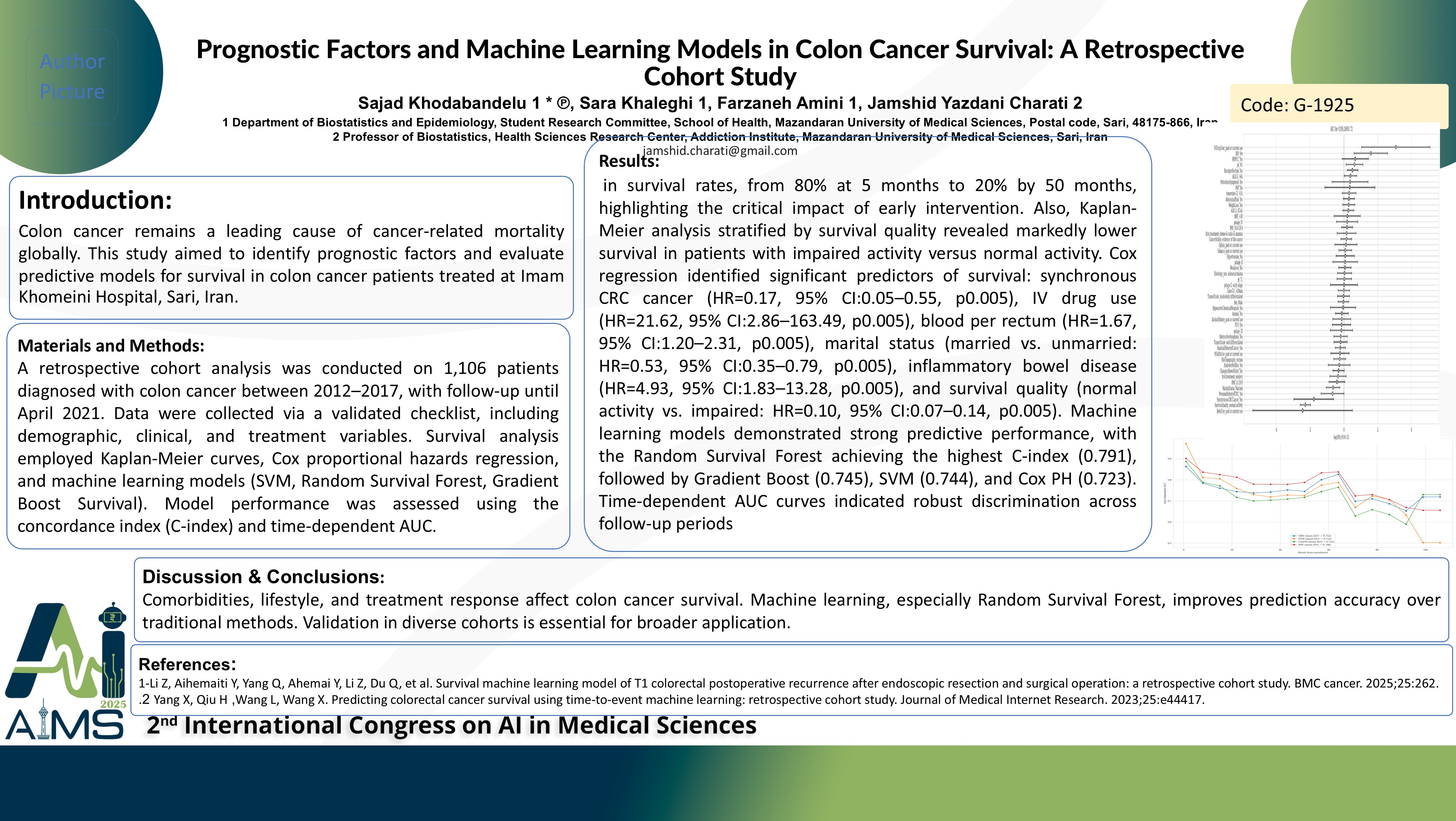Prognostic Factors and Machine Learning Models in Colon Cancer Survival: A Retrospective Cohort Study
کد: G-1925
نویسندگان: Sajad Khodabandelu * ℗, Sara Khaleghi, Farzaneh Amini, Jamshid Yazdani Charati
زمان بندی: زمان بندی نشده!
برچسب: سیستم های تصمیم یار بالینی
دانلود: دانلود پوستر
خلاصه مقاله:
خلاصه مقاله
Background and aims: Colon cancer remains a leading cause of cancer-related mortality globally. This study aimed to identify prognostic factors and evaluate predictive models for survival in colon cancer patients treated at Imam Khomeini Hospital, Sari, Iran. Methods: A retrospective cohort analysis was conducted on 1,106 patients diagnosed with colon cancer between 2012–2017, with follow-up until April 2021. Data were collected via a validated checklist, including demographic, clinical, and treatment variables. Survival analysis employed Kaplan-Meier curves, Cox proportional hazards regression, and machine learning models (SVM, Random Survival Forest, Gradient Boost Survival). Model performance was assessed using the concordance index (C-index) and time-dependent AUC. Results: Among 1,106 patients, 234 (21.2%) experienced mortality. The KM curve revealed a progressive decline in survival rates, from 80% at 5 months to 20% by 50 months, highlighting the critical impact of early intervention. Also, Kaplan-Meier analysis stratified by survival quality revealed markedly lower survival in patients with impaired activity versus normal activity. Cox regression identified significant predictors of survival: synchronous CRC cancer (HR=0.17, 95% CI:0.05–0.55, p0.005), IV drug use (HR=21.62, 95% CI:2.86–163.49, p0.005), blood per rectum (HR=1.67, 95% CI:1.20–2.31, p0.005), marital status (married vs. unmarried: HR=0.53, 95% CI:0.35–0.79, p0.005), inflammatory bowel disease (HR=4.93, 95% CI:1.83–13.28, p0.005), and survival quality (normal activity vs. impaired: HR=0.10, 95% CI:0.07–0.14, p0.005). Machine learning models demonstrated strong predictive performance, with the Random Survival Forest achieving the highest C-index (0.791), followed by Gradient Boost (0.745), SVM (0.744), and Cox PH (0.723). Time-dependent AUC curves indicated robust discrimination across follow-up periods. Conclusion: Key prognostic factors, including comorbidities, lifestyle factors, and treatment response, significantly influence colon cancer survival. Machine learning models, particularly Random Survival Forest, outperformed traditional Cox regression in prediction accuracy. These findings underscore the clinical utility of integrating patient-specific risk factors and advanced predictive models to optimize survival stratification and personalized care. Further validation in multi-center cohorts is warranted to enhance generalizability. The KM plot underscores temporal mortality trends, reinforcing the need for timely clinical management. These insights advocate personalized care strategies and further validation in diverse cohorts.
کلمات کلیدی
Colon Cancer, Survival Analysis, Cox Regression
